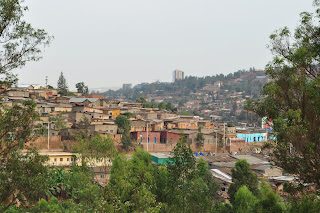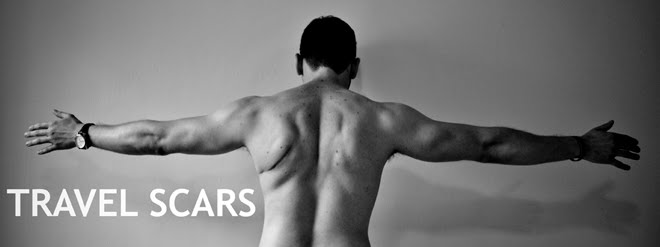While Rwanda had been discussed, it was never part of our original plans. Erik had always planned on going and we decided to join him. We caught a bus at 5:00am and took it towards Ngara, Tanzania. Around 25km from the Rwandan border, we had to exit the bus and catch a taxi to complete the trek.
The cab driver tells us that it will be 15,000 Tsh for the trip and 3,000/ person but he will need to pick up two other passengers. We promptly agree, waiting a few more minutes for more people is fine by us.
However, thinking we're idiots, he starts speeding towards the border, completely ignoring other people in need of a ride. After a hasty arrival to the border he thinks he's been very smart. We hand him 9,000 shillings and he immediately starts bitching. We tell him that we agreed to 3,000 per person and that we were also willing to pick up two more people. It was him who was unwilling to stop and we were therefore not going to pay any more.
He starts pouting and says he is going to get the police so we tell him to go ahead. The border police come and we explain the situation. We agree to give him 12,000 Tsh but refuse to give him the full amount: it's more about the principle than the money.
We leave the driver behind, once again feeling swindled at a border crossing and make our way across the bridge separating the two countries. We briefly admire Les Chutes Rusumo and make our way through customs.

As we're being checked at the border, the officer questions Chris about his oranges. Chris states that he will eat them before he enters and the officer looks at him with a bewildered stare. It turns out he was actually referring to the plastic bag the oranges were kept in, because plastic bags are apparently forbidden in the country (for waste reducing purposes). We all had a good laugh and then made our way to Kigali.
On the 3-hour bus ride we observed what looked like a Kinyarwanda (the language they speak there) stand-up comedy routine between the bus attendant and a belligerent woman obviously pissed about something.

We arrive just as the sun was setting and set out to find a guesthouse. We searched in vain but we eventually met a Belgian couple who drove us to a hostel. The hostel was relatively expensive so Erik managed to haggle a nearby hotel down to a more reasonable price.
Kigali is a beautiful city and is the most developed we had seen since South Africa. It seems to have turned itself around since the genocide 16 years earlier. What isn't beautiful is the cash withdrawal situation: no banks accept Canadian debit cards. Luckily Erik had enough US currency to exchange into Rwandan Francs, to at least cover our dinner.

The following day we go to the National Parks Office to see if they have any Mountain Gorilla permits available. We had talked to a couple the night before and they had tried but to no avail. There's still no harm in trying. We show up and ask the woman at the desk if there's any availability in the next couple of days. Erik's window of opportunity is only until the 8th because after that he has to make his way to Uganda to catch a flight back to the States.
Gorilla permits are typically booked months if not years in advance and are incredibly hard to come by if you show up last-minute. Regardless, we posed the question. Miraculously she had 3 spaces available for the 8th of September! Erik and I had planned on doing it from the beginning, but because the opportunity was so incredible, Chris decided to join us despite the whopping 500$ US per permit.
The woman at the office was going to hold the places for us as long as we would pay that same day. Since no ATMs were compatible with our cards, we went to Banque de Kigali and try cash advancing from our credit cards. I try first and it doesn't work. I try again. No luck. Fuck. I have the opportunity of a lifetime and I can't access any of my money!
Chris tries and it works for him. We later find out you can pay for the permit by credit card, but neither Chris nor mine work. Thankfully Erik's does and the birdman does me a huge solid and lends me the money. Everything was set: we were now going to see one of the rarest animals on the planet!
To celebrate, we were going to party it up!

We started it up with a delicious steak dinner at Chez Robert seated next to a dignitary from the DRC. Not too shabby. Our dinner was accompanied by a delicious Skol beer. We had originally thought that the 500ml beers in most of Africa were big but in Rwanda we were humbled by their Skol, Primus and Mutzig beers, all coming in 720ml bottles! A beer-drinker's paradise. Or demise, depending on how you look at it.
Our next stop was a small bar frequented by locals and travelers alike. The prices were great but the 100% male demographic wasn't our style considering the women in Kigali are absolutely gorgeous. It's like the Montreal of Africa.
We then made our way to Carwash and met some Peace Corps or NGO workers but got bored of the venue and their company and headed to another place. We accidentally stumbled on a place called Papyrus and it was great: the music was good and it actually was quite packed. By this point all 3 of us had run out of money except for our emergency taxi money. Erik had befriended a girl who had offered to drive us to another club. We agreed despite our lack of funds and we were off to Planete Club.
Erik used our taxi money (which wasn't enough even to get one of us into the club) to get all 3 of us in and we commenced to dance. Dancing this intense has not been seen since Kevin Bacon and Patrick Swayze in their heyday. A Canadian UN worker bought us beers and the girl we met gave us a lift back to our hotel. Who says guys can't go to bars without any money and still have a good time?

On a more solemn but absolutely necessary note; the following day we made our way to the incredibly emotive and powerful Kigali Memorial or Genocide Museum. We purchased the audio guide and it was the first time in my life that I have ever read every single caption and watched or listened to every piece of media in a museum. I was captivated.
There wasn't an overwhelming amount of information and the presentation wasn't graphic, gratuitous or sickening. It bluntly explained and exposed what had happened, who was to blame, both perpetrators and the rest of the world who failed to intervene; and gave a human face to the more than 1-million Tutsis who were savagely slaughtered by the Hutus.
It was devastating to see how terrible the world can be and how ordinary people could become murderers and turn on their own family and friends. I had no idea how sinister the methods and how determined the orchestrators were to wipe the Tutsis off the face of the earth.
It sickened me to see that it was the Belgian colonialists who had created these ethnic divisions in the first place, classifying Hutus and Tutsis based on the number of cows they possess (unfortunately I am not even kidding), favouring the Tutsi minority and ptting people who have lived harmoniously for centuries, against each other in order to maintain superiority. All colonial powers established such favouritism and divisions in order to "divide and conquer".
France's role in providing the genocidaires with arms prior to the systematic killings and their unintentional facilitation of fleeing perpetrators was also highlighted by the museum. It also mentioned the dismissive response by the UN at UNAMIR commander Romeo Dallaire's pleas to send more troops to Rwanda. Dallaire stated as few as 5000 troops could have halted the genocide.
Somehow I managed to make it through the entire museum without shedding a tear, that is until I reached the final room of the museum. In it were pictures of children with their names, ages, favorite foods, toys and the names of their best friends: in most cases their parents were listed because they were too young to have friends of their own. At the end of each child's favorite's list was a concise, heart-wrenching sentence describing the way they were brutally killed.
After staring at these poor dead childrens' photos and wondering why am I so fortunate to have been born in a country without war, I left the interior of the museum. On my reflective walk through the gardens, the audio-guide stated that those very gardens now serve as the final resting place of over 250,000 murdered Tutsis. The government had moved many of the victims from outlying mass graves to the more dignified memorial gardens.
Such a waste of life., so much evil and suffering.

I returned my ear-piece and sat in front of the fountain next to Chris. Neither of said very much because we were still trying to grasp the magnitude of what had unfolded 16 years ago in the very city which we were now visiting.
The museum was closing and as we waited for Erik, we noticed the grounds of the museum were surrounded by soldiers armed with automatic weapons that would make anyone nervous. A large group of African men in suits walked towards us and when they were close, one man stated: the honorable Kenneth Kaunda, former President of Zambia.
Chris and I quickly stood up and the former President extended his hand to each of us and said he had come to educate himself like we had. We said it was an honor to meet him and I chimed in that he had a beautiful country (we had been there you know!). Who knows, maybe our picture shaking his hand may have ended up in a Zambian newspaper.
After the former president and his entourage entered the museum, Erik finally came and joined us. We told him what had just happened and I'm pretty sure he was quite jealous. It was not the first time we saw heavily-armed soldiers in Kigali, they were standing literally at every street corner. Also, the night before we had eaten next to a diplomat from the DRC and today we shook hands with the former President of Zambia. Something big was definitely happening in Rwanda.

It turns out that the weekend we showed up in Kigali was during the re-inauguration of Rwandan President Paul Kagame: the same president who led the country out of the shadows of ethnic genocide. He was going to be inaugurated the next day at the football stadium, watched by millions of Rwandans and Africans alike and attended by diplomats and heads of state from all over Africa.
This was going to be huge and we were right in the middle of it!


No comments:
Post a Comment